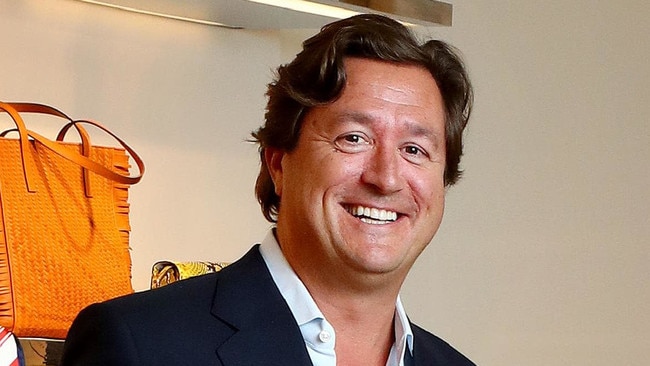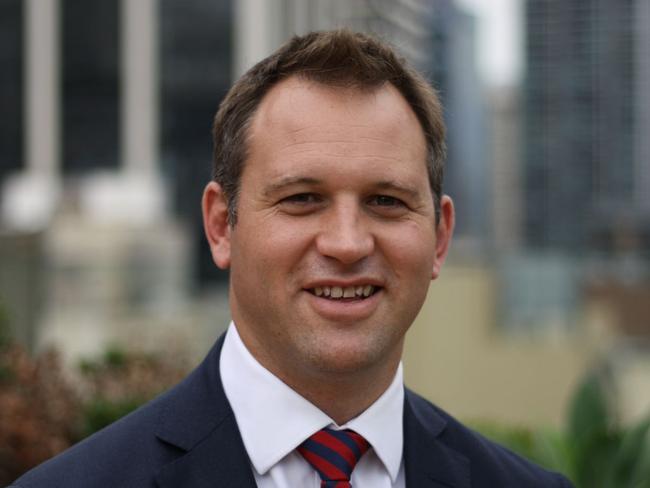Will Vicars doubles down on carbon trade opportunity
When investor Will Vicars first met the founders of CBL Markets they were ahead of their time. Five years later, the corporate world is catching up.

Will Vicars first met Ben Stuart and Nathan Rockliff five years ago.
The rich lister, best known as the part owner and co-chief investment officer of the $10bn Sydney fund manager Caledonia Investments, liked what he saw.
“I spent a bit of time with Ben and Nathan and they were very ambitious,’’ Mr Vicars told The Australian.
“I liked what they were trying to achieve. I believed in the dream of trying to dominate the trading in carbon, water and other renewables while at the same time owning the registry where the renewable energy certificates are held.”
Stuart and Rockliff were the founders of a firm known as CBL Markets, a commodity spot exchange started a decade ago that provides access to the world’s energy and environmental commodity markets.
When Mr Vicars first met them in 2015, they were seeking to tap into the emerging demand from companies around the globe to trade ESG (Environmental Social and Governance) inclusive products, including carbon offset financing and trading.
Today, CBL operates an exchange platform where companies running renewable energy, forestry, water filtration or other carbon neutral projects around the world generating carbon offsets can list their credits.
Carbon-producing firms such as miners and airlines seeking carbon credits can then view those credits, deposit money into CBL’s settlement bank and trade the carbon offset. It is then delivered to their registry account, just like a share trade.
CBL charges a transaction fee on the exchange.
Since 2013, CBL has been the sole supplier of zero carbon offsets to US aviation giant Delta Airlines.
But CBL took some time to get noticed on the global stage. Mr Stuart and Mr Rockliff were undoubtedly ahead of their time.
Now, five years after Mr Vicars first met them and with $US40m of capital in the bank, the corporate world has seemingly caught up to them.
“I was one of their original backers and as it has got bigger and this space has evolved, I have put more money in,’’ Mr Vicars said of his initial investment.
Another early backer was Larry Leibowitz, a former chief operating officer of the New York Stock Exchange.
More recently the Fairfax family’s office, known as Cambooya Investments, became a CBL investor, as did billionaire American private equity pioneer Thomas H. Lee and Jack Klinck, a former executive at State Street and BNY Mellon.
Last year, CBL merged with US technology firm Xpansiv, whose business is to break down the components of a commodity into a digital format, providing a better understanding of the true cost and value of the commodity.
Leibowitz became vice chairman of the merged group, known as the Xpansiv-CBL Holding Group (XCHG), and Xpansiv’s backers — Macquarie Group, oil giant BP and international index provider S&P Global — became shareholders of the larger entity. The Macquarie investment came out of the firm’s commodities business in Houston, Texas.
In addition to CBL and Xpansiv, the third arm of XCHG is the Australian-based water exchange business known as H2OX which facilitates the electronic trading of water entitlements and allocations to farmers, brokers and their clients and non-irrigation participants.

“Our water business is our biggest business in Australia,’’ said Mr Stuart.
“The Australian water market is the biggest in the world. We see the potential for the Australian market to become the ‘WTI of Water’ globally.”
Mr Vicars considers there has now been a sea-change in the corporate world in its attitude towards achieving zero emissions targets.
“I think a tipping point has been reached, driven by social media and the collective want. Governments of all persuasions are now endorsing and trying to show leadership in this space as well. These seem such inevitable trends to get in front of and they are now accelerating,’’ he said.
XCHG has raised more than $US40m since the merger in August last year for growth capital and is now raising $US70m in a Series B funding round to bankroll several targeted acquisitions in America.
“We have some significant names we are talking to in the raising process from a strategic user and product development side. We see that as smart money,’’ Mr Stuart said.
He said the acquisition targets would be some key companies in America involved in commodity exchanges that would give XCHG increased depth of infrastructure and access to the market.
Fresh from Caledonia’s record year — the firm’s combined strategy performance of its Global Fund and its Global Co-Invest fund was up 38 per cent in the June quarter and up 31 per cent for the financial year, after fees — Mr Vicars is doubling down on his XCHG investment in the raising.
It is one of the few investments he has outside Caledonia, which accounts for 95 per cent of his wealth, valued on The Australian’s “The List of the Nation’s 250 Richest People” at $600m.
Two years ago Mr Vicars rescued the 80-year-old Australian luxury leathergoods and accessories retailer Oroton from administration in a $25m transaction. He was a large shareholder in Oroton before the deal.
Mr Vicars also boasts an extensive residential, rural and commercial property portfolio.
While XCHG is a very small investment compared to Caledonia, the company excites him, especially for the role it will play in the evolution of commodity markets towards zero emission targets.
“The collective view is it’s good for the world to be carbon neutral. Ben and Nathan have stuck at it and it seems now that they are among the leading participants in this space in the world,’’ he said.
“I do think that the ultimate ownership and what platform the exchange sits on will be determined by further consolidation in the sector and what is in the best needs of the end users.
“There are very few investment opportunities in this space and that’s what makes this company so interesting.”
More than $1bn worth of environmental assets are now going through the CBL platform as going carbon neutral has become the latest corporate fashion over the past 18 months.
The shift in the value of “low-carbon commodities” has been highlighted by Liberty Steel Group’s aim for carbon-neutral steel, Qantas’ ambition to slash emissions to zero by 2050 and Rio Tinto’s stated desire to produce low-carbon aluminium.
Last month, Telstra was certified carbon neutral in its operations by using CBL to purchase 2.3 million carbon offset credits from carbon-neutral projects around the world.
“We are in the right place at the right time,” Mr Stuart said.
“It has been 10 years of work to get here. The space has caught up to us.
“This is the way commodities will trade going forward. Those markets, especially energy, are going through an extraordinary evolution at the moment towards net zero-emission targets.
“Without companies like us, the majors like the BPs and the Shells won’t make their targets.”




To join the conversation, please log in. Don't have an account? Register
Join the conversation, you are commenting as Logout